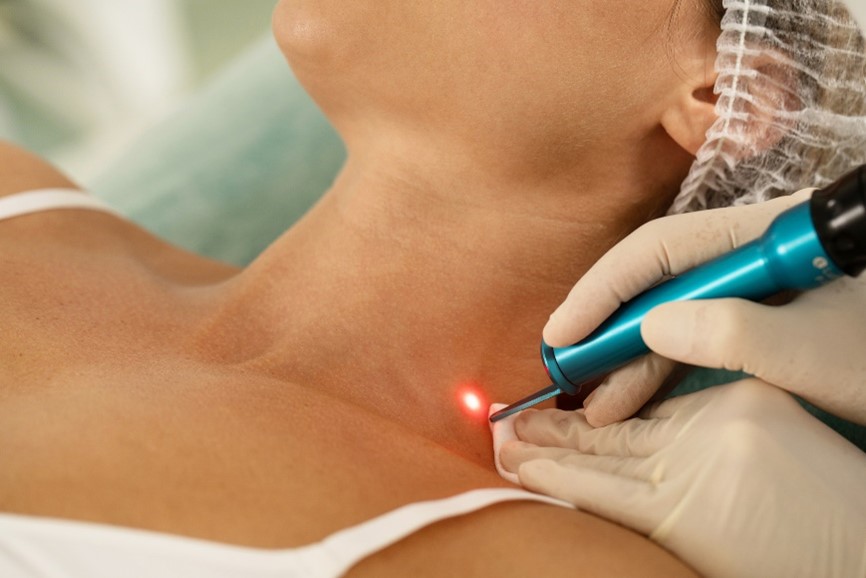How Are Lasers Used in Skincare?

Advances in Lasers for Cosmetic Uses
If the idea of a laser near your face makes you nervous, you are not alone. Traditionally, lasers were an aggressive form of treatment, with a high risk of scarring and hyper or hypo-pigmentation. As technology has progressed, though, the technology has become significantly safer. Now, using fractionated CO2 laser treatment, dermatologists can provide a host of treatments safely and effectively, with very little downtime.
Types of Lasers
Lasers work by firing a narrow beam of light, in which the light waves all have a similar wavelength. However, there are different types of lasers. The first differentiation is between ablative and non-ablative lasers. Ablative lasers vaporize tissue, removing the top layer of skin. Non-ablative lasers, on the other hand, produce heat-induced injury at various depths in the skin, leaving the epidermis intact. This stimulates collagen, tightens skin, reduces pigment, and diminishes acne and acne scars. Ablative lasers are effective, but they require much more downtime for recovery. Further division of lasers occurs because both ablative and non-ablative lasers can be fractional. Fractional lasers work using laser energy that has been divided into small, deep columns known as microthermal treatment zones. Recovery from fractional laser treatment is faster than after treatment with “non-fractional” lasers because less tissue has been treated. Treating a fraction of the skin at a time allows the tissue to regenerate more quickly. Fractional, non-ablative lasers are generally safe for both light and dark skin.
What Skin Issues Do Lasers Address?
Your dermatologist will choose the right laser to do the job, and many different issues can be addressed with laser treatments.
- Redness and rosacea are treated with vascular lasers, which target hemoglobin. These lasers can address spider veins and vascular birthmarks as well.
- Hyperpigmentation and dark spots are treated with pigment-reducing lasers. These are used for sunspots, pigmented birthmarks, and tattoos.
- Laser hair removal is done with hair removing lasers that target melanin in hair follicles. The heat produced by these lasers damages the follicle so that the hair can’t grow back.
- Fine lines, wrinkles, and scars are treated with resurfacing lasers. The thermal damage from these lasers triggers the generation of new collagen.
Do Lasers Cause Pain?
The lasers your dermatologist uses may cause slight discomfort, like a slight pricking or stinging sensation. The type of laser used and the individual’s pain tolerance factor into the intensity of the discomfort. Even if your treatment is extremely uncomfortable, though, you can count on laser treatments to be over quickly.
What Happens After Laser Treatment?
After your skin has been treated with lasers, you will need to be gentle with it. Just as you wouldn’t sit in a sauna or vigorously rub your skin with a towel after a sunburn, you don’t want to do those things after laser treatment. It is extremely important to protect your skin from the sun after a laser treatment, because your skin will be especially sensitive to UV light. Don’t exfoliate or use retinoids, and refrain from smoking, which can slow healing.
Contact Swinyer-Woseth for All Your Skincare Needs
Whether you are interested in laser treatments or you’re just looking for a dermatologist to help you care for your skin and hair, look to Swinyer-Woseth Dermatology. Committed to providing superior, professional skin care in a manner that’s practical, efficient, and compassionate, we have the knowledge and skill not only to treat your skin but also to recommend skincare products to help you care for your skin at home. With over 30 years of experience providing dermatological services in Salt Lake City, we provide a variety of services, from cosmetic skincare to treatment for skin cancer. Our team of board-certified dermatologists and licensed cosmetic service providers are here to provide you with the care you need in a comfortable, professional atmosphere. Call (801) 682-4715 or contact us through our website.
